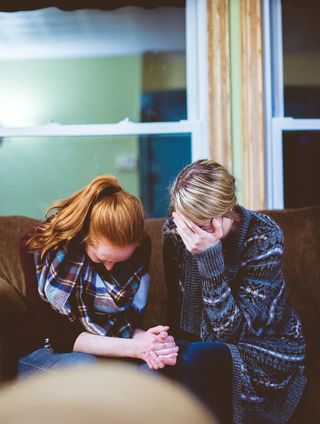Health
The Privilege of "Positive Vibes Only" in a Pandemic
Ways to help your struggling friends without toxic positivity.
Posted May 11, 2020 Reviewed by Matt Huston

On her 9th birthday, Aubrey from Florida received the gift of a lifetime when invited to appear on The Office actor John Krasinski’s YouTube channel, Some Good News. Krasinski learned through Twitter that Aubrey was deeply disappointed she would be missing a performance of the Broadway musical Hamilton due to the current pandemic. On his show, he surprised her with tickets to New York and finished the episode with the cast of Hamilton serenading Aubrey via Zoom. Shortly after, her mother tweeted that “Aubrey’s still asking if she was dreaming.”
The same day the episode aired, a different story was unraveling states away. Illinois couple Patrick and Cheryl, both in their 50s, were living together when they became frightened that they had contracted COVID-19. Cheryl’s concern grew when she began having difficulty breathing. The anxiety escalated to the point that Patrick shot and killed his partner before turning the gun on himself.
The range of experiences caused by coronavirus is vast. While many are learning new baking or crafting skills at home, others are losing loved ones, facing empty cupboards, and experiencing suffocating loneliness. Positive news articles can lift our spirits and give us hope, but they ignore the real experiences had by those less fortunate.
The Journal of Mental Health recently published an article on the mental health consequences of COVID-19. It reports an increase in domestic violence cases and mental illness. Beyond the symptoms of the virus, researchers worry there will be increases in depression, suicide, and self-harm globally. Closures have reportedly increased alcohol withdrawal symptoms and suicides by addicts. There may be increases in OCD from frequent handwashing and health emphasis.
The authors state, “besides mood-related and emotional outbursts, especially panic, fear, avoidance and fear in meeting other people, fear of death (Thanatophobia), fear of getting isolated, stigmatization, fear of even not getting essential items, food, etc., may have its psychological manifestations.” The national public health group Well Being Trust estimates that as many as 75,000 Americans could die from drug or alcohol misuse and suicide as a result of the coronavirus pandemic.
Sharing positive news stories is not a bad thing. The problem is when we refuse to hear the voices of those who are struggling or meet complaints with “look on the bright side.” Striving to spread hope can easily fall into toxic positivity. This is defined as “the excessive and ineffective overgeneralization of a happy, optimistic state across all situations. The process of toxic positivity results in the denial, minimization, and invalidation of the authentic human emotional experience.”

I recently came across a social media post in a neighborhood group that insisted we only talk about the good that has come from the pandemic. Being able to simply look away or ignore bad news is a privilege for those who likely have stable incomes, strong support systems, and good mental and physical health. Not everyone has that luxury. Which is not to say we should bombard ourselves with negative news stories, but simply that we should acknowledge that some people are suffering greatly.
When loved ones open up about their battles, they are not looking for their concerns to be dismissed by our positive spins. I discovered this the hard way a few years ago when a family member learned that her newborn daughter was hard of hearing. I casually responded, “Oh. Well, at least she didn’t lose all of her hearing. That’s good, right?”
The family member, with noticeable frustration, explained that this would have a huge impact on her daughter’s life. She would always need hearing aids. She would need to learn sign language for when hearing aids were unusable, such as in the bathtub. She would be in special education programs and have to navigate a difficult terrain for friendships and belonging.
I felt awful that I had dismissed the seriousness of the situation without taking the perspective of my family member first. It was only after I empathized with her concerns and sat in the pain and fear with her that her spirit seemed to lift. As researcher Brene Brown said, “Rarely, if ever, does an empathic response begin with ‘at least.’”
What can we do instead of painting a silver lining around the struggles of another?
1. In order to help others, strive to be emotionally regulated. When we take care of our own physical and mental health, our capacity to look outward increases. Make a conscious effort to exercise, eat nutrient-dense foods, prioritize healthy sleep habits, and practice self-compassion.
2. Channel empathy into compassion, not distress. Compassion is recognizing the emotions of others and having concern for their well-being. This leads to positive feelings and helping behaviors. Affective empathy is feeling the negative emotions yourself and leads to burnout and empathic distress. Often when we encounter negative stories, we turn away because we allow ourselves to feel the same distress others are experiencing. Try practicing loving-kindness (compassion) meditation to transform distress into love and concern.
3. Listen with kindness and acknowledge feelings. Avoid "silver-lining" their problems and concerns. Avoid comparing who is suffering more. Avoid stigmatizing those who, for example, choose not to wear a mask or unknowingly share misinformation. Seek understanding before offering advice. Don’t be afraid to ask difficult questions, such as, “Are you feeling suicidal?” as this does not increase the risk of suicide.
4. Direct others to mental health resources. Many of our friends and neighbors can benefit from counseling services and community programs. Help lessen the stigma of help-seeking with your compassion. There are many resources, such as the suicide prevention lifeline, the national domestic violence hotline, the crisis text line, and others. Those seeking a therapist can find one here.
5. Call the police when others are in imminent danger. If you think your friends are in danger of harming themselves, harming others, or being harmed, do not hesitate to call emergency services. As one resource on suicide states, “Timely intervention can make a difference and save a life. Even if someone seems angry at you for helping, in time, they will be grateful for it.”
If you have the privilege of striving for personal growth this pandemic, consider the experiences of those simply trying to survive. Rather than feeling guilty for your privilege, use it to fuel your compassion toward others. As philanthropist Elizabeth Gilbert said, “Those of us who are warm and dry and safe and well-fed must show up for those who are cold and wet and endangered and hungry. That’s a rule of life.”
Facebook image: Dodokat/Shutterstock




